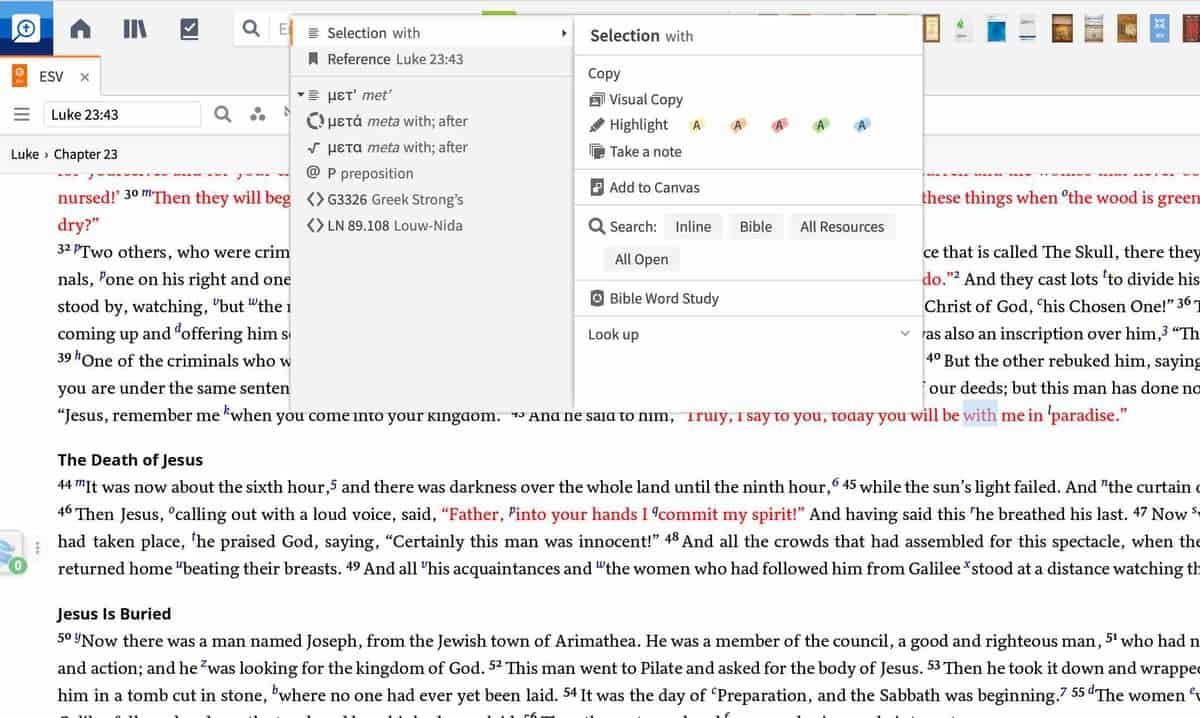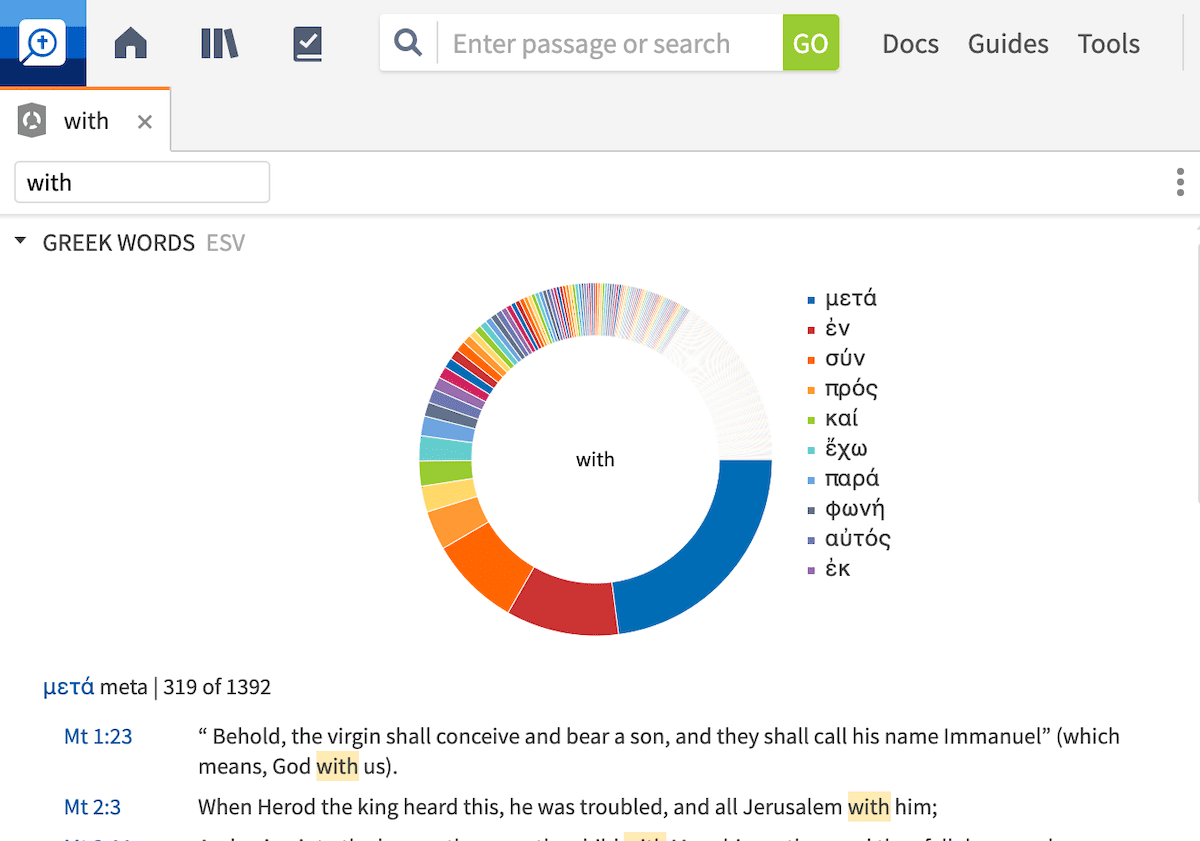Sometimes Jesus’ words are confusing—like when he told the thief on the cross, “Today you will be with Me in Paradise” in Luke 23:43. What did he mean?
 In Navigating Tough Texts: A Guide to Problem Passages in the New Testament, Murray J. Harris (author of the excellent resources Colossians and Philemon [Exegetical Guide to the Greek New Testament | EGGNT] and Prepositions and Theology in the Greek New Testament) helps inquisitive minds navigate such passages.
In Navigating Tough Texts: A Guide to Problem Passages in the New Testament, Murray J. Harris (author of the excellent resources Colossians and Philemon [Exegetical Guide to the Greek New Testament | EGGNT] and Prepositions and Theology in the Greek New Testament) helps inquisitive minds navigate such passages.
In this excerpt adapted from Navigating Tough Texts, Harris offers an explanation of what Jesus meant in Luke 23:43 in this second of seven statements he made while hanging on the cross.
***
Although one of the criminals crucified with Jesus poured abuse on him and taunted him (Luke 23:39), the other reprimanded his fellow criminal and then directed a request to Jesus: “Remember me when you come into your kingdom” (Luke 23:42). “Remember me” is an earnest plea not simply for passing notice (“Spare a thought for me!”) but for mercy in the royal court when Jesus assumes his kingly status and power.
Through his reply, Jesus was not only responding to the man’s persistent request, indicated by the imperfect-tense elegen (“he said”). Jesus [was] also recognizing his confession of guilt (v. 41) and implied repentance, his assertion of Jesus’ innocence (v. 41), and his belief in the afterlife along with Jesus’ kingship and rule in that afterlife (v. 42). “I solemnly assure you, today you will be with me in paradise” (v. 43).
“Today you will be with Me in Paradise”
“Today” means “this very day”—that is, “before the present day ends, when we are being crucified.” The Greek word order shows that “today” belongs with the phrase “with me,” not with “I solemnly assure you.” “Paradise” here refers to the dwelling place of the righteous dead, which is either synonymous with the third (= the highest) heaven or located within the third heaven (see 2 Cor 12:4), the abode of God. Either way, it is a place of transcendent blessedness because of the presence of the resurrected Christ.
This verse is one of three NT texts that depict the status of believers between their death and their resurrection. In each passage, it is implied that there is no interval between the moment of death and the time of arrival in Christ’s presence. To depart is to arrive.
- We are confident, I repeat, and prefer to depart from this body and take up residence with (pros) the Lord. (2 Cor 5:8)
- I am torn between these two alternatives. I am longing to break camp and so be with (syn) Christ, for this is a far, far better state. (Phil 1:23)
- Today you will be with (meta) me in paradise. (Luke 23:43)
Although three different Greek prepositions are used in these verses (usually all translated by the English “with”), a single reality is represented—conscious fellowship with Christ after death. In themselves, the prepositions need mean no more than “in the presence of” and contain no idea of reciprocity of action. But with this said, it seems inadequate to conclude that the believer’s dwelling with the Lord implies no more than incorporation in Christ, or their spatial juxtaposition to Christ (as when a chair is said to be “with” a table), or their being in a state of suspended animation (“soul-sleep”).
Prepositions that in themselves suggest simply a passive juxtaposition in space introduce, when applied to interpersonal relationship, the idea of dynamic mutual fellowship (see also part 2, ch. 60). What a prospect!
As to the locality of the Christian dead before their resurrection, there are two representations in the NT. From the viewpoint of the living who witnessed the burial of the dead and saw them disappear from view, they are resting in the grave (John 5:28–29; 1 Thess 4:16–17; cf. Acts 13:36) or residing in Hades (Acts 2:27, 31), the invisible realm in the heart of the earth (Matt 12:40) in which all the dead are temporary residents. From the viewpoint of faith, which sees the invisible, they are in proximity to God. This can be expressed as table fellowship with Abraham (Luke 16:23); as inhabiting resting places in the Father’s house (John 14:2) or eternal abodes (Luke 16:9); as active fellowship with Christ in paradise (Luke 23:43) or heaven (John 12:26; 2 Cor 5:8; Phil 1:23); or, in the case of martyrs, as waiting under the heavenly altar (Rev 6:9).
Victory over death and Hades
But a question naturally arises. How is Jesus’ implied ascent into paradise immediately after his death related to his “descent into Hades” (Matt 12:40; Acts 2:31; Rom 10:7) at his death? Perhaps the answer is that Jesus’ sweeping cosmic movement from earth to exaltation in heaven was by way of a temporary visit to Hades where he announced to the “imprisoned spirits” his victory over death and Hades (cf. 1 Pet 3:19; Jude 6; Rev 1:18).1
***

But there’s more to learn!
Want to study “with” more deeply? With the Bible Word Study Guide in Logos, you can find every time meta is used in the New Testament and how each instance is translated, as well as how the “with” passages above use the word.
Here’s how to do it:
- Open your Bible in Logos to Luke 23:43, then right-click on the word “with.”
- From the dialog box, choose Bible Word Study. If you choose the Bible Word Study on the right, Logos will open a new tab with more details on the English word “with.” If you choose the Bible Word Study icon next to meta on the left, it will open a new tab with more details on the Greek word meta.
- From there, you can explore differences in how the word is used. In this Bible Word Study on the English word “with,” you can see the different Greek words that are translated as “with,” along with passages where they appear.
And that’s not all. If you want to search for every occurrence of “with God” (whether it’s a divine name or pronoun), just enter: with BEFORE 1 WORD (<Person God>,<Person Jesus>,<Person Holy Spirit>) in the search field, and Logos will instantly curate a list for you.
Learn how Logos can help you do even more Bible research like this, and buy it now!
Related articles
- What Did Jesus Mean When He Cried Out ‘It Is Finished!’ in John 19:30?
- Satan in the Bible: 14 Sobering Facts about the Devil
- What Does ‘Binding and Loosing’ Mean in Matthew 16:19?
- 5 Insights for Interpreting the Deaths of Ananias and Sapphira
- The Unforgivable Sin: Evidence You Have Not Committed It
Related resources
- The Unseen Realm Bundle (12 vols.) by Dr. Michael S. Heiser
- Prepositions and Theology in the Greek New Testament by Murray J. Harris
- Perspectives on Justification by Faith: Five Views on Its Meaning and Significance (4 hour course)
- Tough Topics: Biblical Answers to 25 Challenging Questions by Sam Storms
- Harris, Murray J. 2020. Navigating Tough Texts: A Guide to Problem Passages in the New Testament. Bellingham, WA: Lexham Press.









